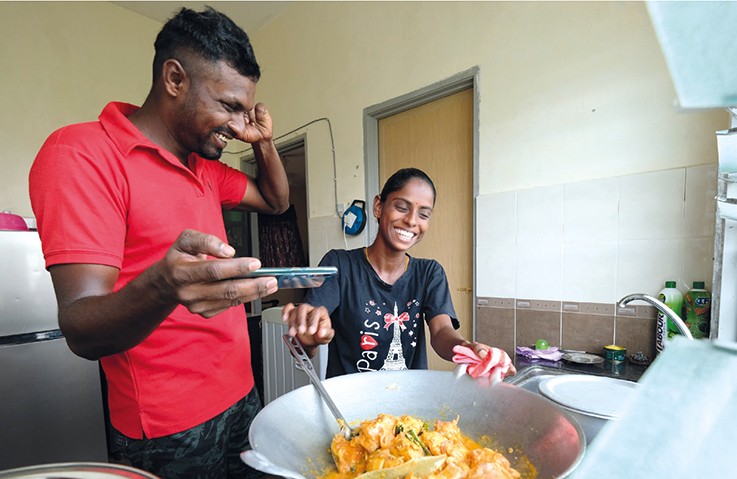
While many small and medium enterprises (SMEs) and start-ups have adopted digitalisation as a reaction to the coronavirus’ impact on businesses, some are still fumbling with tools and solutions.
Logistics company TheLorry.com co-founder Nadhir Ashafiq said due to the nature of the company, its resources were immediately underutilised upon the implementation of the Movement Control Order (MCO), so they had to move fast with existing digital tools.
“We looked at what is really moving and saw that keyword searches relating to food delivery increased by 10 times. We felt that this was an opportunity to pounce on.
“We launched a simple page which took around three to four days to finish, launched surveys in under a week and looked at grocery stores to understand the home delivery services.
“I would strongly suggest any entrepreneur to go online and use tools provided by Google to increase your visibility. Right now, there are very competent courier players to get your items to your customers,” he said at the Advancing Malaysia’s Economic Recovery live stream by Google Malaysia yesterday.
He also said companies that offer services should also be creating content.
“Just showcase your skills and techniques on YouTube and other social media platforms. If the content is good, not only will it be promoted 10 times over, but it will also raise brand awareness and sell the products and services featured in the content,” he said.
The live stream also featured YouTube sensation Sugu Pavithra (picture) and Langit Collective co-founder Melisa Lim, who learned how to use Google tools and solutions during the MCO.
Pavithra, who had gained over 750,000 subscribers within six months and over 31 million in total views on her channel which she shares with her husband Sugu, received the Silver Play Button award from YouTube and started earning in US dollar through their cooking videos.
“Our channel is very cooking-centric and to be honest, we want to try doing other interesting videos although we probably would not venture too far outside of cooking. Perhaps a lifestyle content, such as gardening.
“We did not expect to shoot to fame. Now, we have a manager and have used our boom of new income to move into a better home, but we want to take it slow and go with the flow with what we have,” she said.
She added that there is a possible opening of an eatery in the future, but not too soon.
Langit Collective, a food supplier which aspires to bring economic empowerment to rural communities and smallholder farmers, said their online revenue has increased since their digital adoption.
Lim said the company began to produce more video contents during MCO to virtualise the salesperson act, and utilised Google analytics to figure out the sort of information and interests that clients look for.
“We already had an existing e-commerce presence, but it contributed only 10% to our total revenue.
“When we could not sell offline, we regrouped and figured out how we can make our online presence more visible,” she said.
One online tool that they had not used actively was Google My Business.
“We did not venture into this particular tool as much before, and the results were pretty surprising when we started using it as a social media platform. It contributed to a lot of free traffic.
“With this traffic, we launched new products, collaborated with local brands, and accelerated our digital journey more than we had planned,” she said.
Google, with YouTube on its platform, has rolled out various initiatives and programmes since March for businesses to learn new digital skills, adapt and rebuild their companies.
Google Malaysia country head Marc Woo hoped that the company’s ongoing efforts will strongly contribute to the country’s economic recovery.
“We want to help Malaysians stay positive, resilient and to make the most of the situation at hand — whether it is for a business owner, entrepreneur, or a job seeker — that is looking to progress, develop and grow,” he said.
Its Malaysia, Singapore and South Asian Frontier marketing head Lars Anthonisen said small businesses make the backbone of the economy.
“Hence, we focused our effort on ensuring that the existing tools and resources are relevant in supporting the survival,” he said.
In support of the Go Digital Asean programme, an initiative by the Asean Coordinating Committee on Micro SMEs and the Asia Foundation, Google announced a RM14 million allocation to help equip SMEs and underprivileged communities with crucial digital skills and tools in rural and remote areas.
The programme will train 15,000 Malaysian SMEs, unemployed youths, indigenous communities and people with disabilities with the help of the International Youth Centre and Startup Malaysia.
Similarly, the Google for Startups Accelerator: South-East Asia is a three-month online programme for high potential, early stage tech start-ups across the region which was launched recently, focusing on solutions relating to healthcare, education, finance or logistics.
The company has also shifted its in-person training programme online, with “Mahir Digital bersama Google” seeing additions of new modules to guide business owners in building online presence and taking sales online, as well as offering a free one-stop online platform for Malaysians to enhance their Google knowledge, called Skillshop.
According to Google, the training has helped upskill over 8,000 Malaysians in the past year.
Source: https://themalaysianreserve.com/2020/07/09/entrepreneurs-recommend-content-creation-google-tools-for-post-covid-19-digital-solutions/

